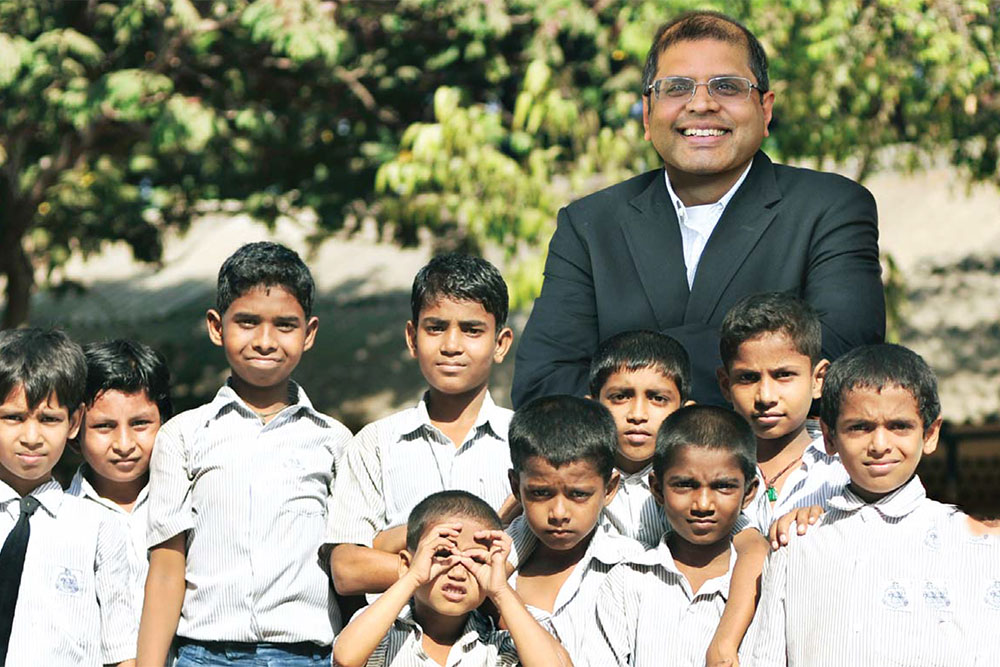A sense of déjà vu prevailed over Amit Chandra when he considered taking charge as the India head of Bain Capital in 2008 — he had another offer with a larger work profile and better perks. The catch? It would have left him with hardly any time to pursue his interest in the social sector. Previously, during his 13-year stint at DSP-Merrill Lynch, he and his family became active supporters of the Akanksha Foundation, which educates children from slums in Mumbai and Pune. Social sector circles know him as the investment banker willing to run the extra mile to raise funds for a cause.
When Chandra quit DSP-Merrill Lynch as MD of India operations in 2007, he wanted to devote all his time to the social sector but family and friends counselled him to reconsider. He then took a conscious call to remain within the demands of the corporate world, not for personal comfort but to help out the social sector with resources from the outside. The Bain assignment allowed him the space to spend about 10-15 per cent of his work time on the social sector. “The challenge is to do this in a manner that serves as an increment to my professional commitments and does not come at their expense,” says Chandra, now MD of the India chapter of the global private investment firm.
Chandra draws inspiration from these words: the sole purpose of business is to serve society. He serves on the boards of Akanksha Foundation and GiveIndia, a donation platform that enables supporters to contribute to over 150 NGOs (the money is not raised for GiveIndia but rather for the NGOs it lists). Chandra is also active with the Delhi-based Credibility Alliance, a consortium of voluntary organisations which works to uplift the standards of NGOs.
The Indian social sector is not known to be very process-oriented, unlike its corporate counterpart. Chandra says he tries to bridge the divide by helping the social sector develop tools that have been proven in the corporate world. “Often, giving time is more valuable than giving money,” says Chandra, who involves himself at both the strategy and execution levels at Akanksha and GiveIndia. In fact, he does not find dividing his time between the corporate and social sectors demanding, concluding, “Nothing is challenging if it comes from deep within and one enjoys it.”
Give and give
At GiveIndia, Chandra spends 10-12 hours every month working with the management on issues ranging from HR and processes to ideating and overseeing events to simply picking up the phone to network for a cause. “People like Amit are still more of an exception,” says Venkat Krishnan N, GiveIndia’s director, who spent years in the corporate world before joining the social sector. “Typically, a senior executive in a US firm is an active board member with two or three NGOs. There are only a handful of corporate honchos in India who devote that sort of time,” he says.
Chandra is of the view that the Indian social sector is beginning to come of age, especially in process-orientation, transparency and credibility. “In the last few years, there have been improvements on all these counts,” he says. “I believe we are at an inflection point, quite like we were in the corporate sector of the ’90s.”
As for India Inc’s record of giving back to society, Chandra feels that corporate and family giving were probably a lot more prevalent in the years prior to Independence, and for a short period just following it. “History suggests that families and businesses had a greater sense of responsibility towards society and nation building, despite the relatively modest wealth creation in that period,” he says.
Over time, he feels, “Businesses focused more uni-dimensionally on wealth creation, sometimes with the belief that it is the government’s job to take care of social issues.” He adds, “There has been a broader recognition in recent years that wealth should be used for social issues globally and within India but corporate giving in India is at a nascent stage.”
In a few years, Chandra hopes to work full-time for the social sector, realising a long-cherished dream. He says firmly, “The challenges and potential for impact makes this an exciting career.”











